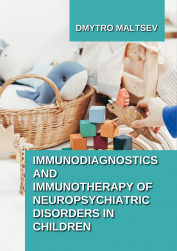Results of the study of the microbial spectrum in children with autism spectrum disorders associated with genetic deficiency of the folate cycle
Keywords:
immunodiagnostics, immunotherapy, neuropsychiatric disorders, children, diagnostics, therapySynopsis
Evidence from a number of recent independent meta-analyses and systematic reviews of randomized controlled trials, published in peer-reviewed medical journals indexed in the PubMed (MEDLINE) abstract bibliographic electronic database, indicates that genetic deficiency of the folate cycle (GDFC) is associated with the clinical phenotype of autism spectrum disorders (ASD) in children. Results of a meta-analysis of randomized controlled trials by B. Q. Guo et al. in 2020, which included 31 trials involving 3304 children, including 1641 patients with ASD, without genetic clarification of the diagnosis, demonstrated that hyperhomocysteinemia, a phenomenon specific to GDFC, is associated with ASD and is a class feature of such children (Hedges's g = 0.56; 95 % CI = 0.36–0.76, p < 0.001). N. S. Mohammad et al., using the ANN (artificial neural network) model in a controlled clinical study involving 138 children with ASD and 138 healthy individuals, showed that the determination of pathogenic polymorphic variants of the genes GCPII C1561T, SHMT1 C1420T, MTHFR C677T, MTR A2756G, and MTRR A66G for diagnostic purposes allows determining the risk of developing ASD in a carrier with an accuracy of 63.8 %. These data allow us to consider GDFC as the main factor in the genetic predisposition to the development of ASD in children.
References
Azhari, A., Azizan, F., Esposito, G. (2018). A systematic review of gut‐immune‐brain mechanisms in Autism Spectrum Disorder. Developmental Psychobiology, 61 (5), 752–771. https://doi.org/10.1002/dev.21803
Baj, J., Sitarz, E., Forma, A., Wróblewska, K., Karakuła-Juchnowicz, H. (2020). Alterations in the Nervous System and Gut Microbiota after β-Hemolytic Streptococcus Group A Infection-Characteristics and Diagnostic Criteria of PANDAS Recognition. International Journal of Molecular Sciences, 21 (4), 1476. https://doi.org/10.3390/ijms21041476
Binstock, T. (2001). Intra-monocyte pathogens delineate autism subgroups. Medical Hypotheses, 56 (4), 523–531. https://doi.org/10.1054/mehy.2000.1247
Cabanlit, M., Wills, S., Goines, P., Ashwood, P., Van de Water, J. (2007). Brain‐Specific Autoantibodies in the Plasma of Subjects with Autistic Spectrum Disorder. Annals of the New York Academy of Sciences, 1107 (1), 92–103. https://doi.org/10.1196/annals.1381.010
Cirillo, E., Giardino, G., Ricci, S., Moschese, V., Lougaris, V., Conti, F. et al. (2020). Consensus of the Italian Primary Immunodeficiency Network on transition management from pediatric to adult care in patients affected with childhood-onset inborn errors of immunity. Journal of Allergy and Clinical Immunology, 146 (5), 967–983. https://doi.org/10.1016/j.jaci.2020.08.010
Cocchi, P., Mori, S., Ravina, A. (1973). Myeloperoxidase-deficient leucocytes in streptococcal infections. Helvetica Paediatrica Acta, 28 (1), 79–85
DeLong, G. R., Bean, S. C., Brown, F. R. (1981). Acquired Reversible Autistic Syndrome in Acute Encephalopathic Illness in Children. Archives of Neurology, 38 (3), 191–194. https://doi.org/10.1001/archneur.1981.00510030085013
Dop, D., Marcu, I., Padureanu, R., Niculescu, C., Padureanu, V. (2020). Pediatric autoimmune neuropsychiatric disorders associated with streptococcal infections (Review). Experimental and Therapeutic Medicine, 21 (1). https://doi.org/10.3892/etm.2020.9526
Ghaziuddin, M., Tsai, L. Y., Eilers, L., Ghaziuddin, N. (1992). Brief report: Autism and herpes simplex encephalitis. Journal of Autism and Developmental Disorders, 22 (1), 107–113. https://doi.org/10.1007/bf01046406
Gillberg, I. C. (1991). Autistic Syndrome with Onset at Age 31 Years: Herpes Encephalitis as a Possible Model for Childhood Autism. Developmental Medicine & Child Neurology, 33 (10), 920–924. https://doi.org/10.1111/j.1469-8749.1991.tb14804.x
González Toro, M. C., Jadraque Rodríguez, R., Sempere Pérez, Á., Martínez Pastor, P., Jover Cerdá, J., Gómez Gosálvez, F. A. (2013). Encefalitis antirreceptor de NMDA: dos casos pediátricos. Revista de Neurología, 57 (11), 504–508. https://doi.org/10.33588/rn.5711.2013272
Guo, B.-Q., Li, H.-B., Ding, S.-B. (2020). Blood homocysteine levels in children with autism spectrum disorder: An updated systematic review and meta-analysis. Psychiatry Research, 291, 113283. https://doi.org/10.1016/j.psychres.2020.113283
Harberts, E., Yao, K., Wohler, J. E., Maric, D., Ohayon, J., Henkin, R., Jacobson, S. (2011). Human herpesvirus-6 entry into the central nervous system through the olfactory pathway. Proceedings of the National Academy of Sciences, 108 (33), 13734–13739. https://doi.org/10.1073/pnas.1105143108
J. Heath, J., D. Grant, M. (2020). The Immune Response Against Human Cytomegalovirus Links Cellular to Systemic Senescence. Cells, 9 (3), 766. https://doi.org/10.3390/cells9030766
Hughes, H. K., Ashwood, P. (2018). Anti-Candida albicans IgG Antibodies in Children With Autism Spectrum Disorders. Frontiers in Psychiatry, 9. https://doi.org/10.3389/fpsyt.2018.00627
Hughes, H. K., Mills Ko, E., Rose, D., Ashwood, P. (2018). Immune Dysfunction and Autoimmunity as Pathological Mechanisms in Autism Spectrum Disorders. Frontiers in Cellular Neuroscience, 12. https://doi.org/10.3389/fncel.2018.00405
Jyonouchi, H., Geng, L., Streck, D. L., Toruner, G. A. (2012). Immunological characterization and transcription profiling of peripheral blood (PB) monocytes in children with autism spectrum disorders (ASD) and specific polysaccharide antibody deficiency (SPAD): case study. Journal of Neuroinflammation, 9 (1). https://doi.org/10.1186/1742-2094-9-4
Kiani, R., Lawden, M., Eames, P., Critchley, P., Bhaumik, S., Odedra, S., Gumber, R. (2015). Anti-NMDA-receptor encephalitis presenting with catatonia and neuroleptic malignant syndrome in patients with intellectual disability and autism. BJPsych Bulletin, 39 (1), 32–35. https://doi.org/10.1192/pb.bp.112.041954
Klebanoff, S. J., Kettle, A. J., Rosen, H., Winterbourn, C. C., Nauseef, W. M. (2013). Myeloperoxidase: a front-line defender against phagocytosed microorganisms. Journal of Leukocyte Biology, 93 (2), 185–198. https://doi.org/10.1189/jlb.0712349
Kong, X., Liu, J., Cetinbas, M., Sadreyev, R., Koh, M., Huang, H. et al. (2019). New and Preliminary Evidence on Altered Oral and Gut Microbiota in Individuals with Autism Spectrum Disorder (ASD): Implications for ASD Diagnosis and Subtyping Based on Microbial Biomarkers. Nutrients, 11 (9), 2128. https://doi.org/10.3390/nu11092128
Kuhn, M., Grave, S., Bransfield, R., Harris, S. (2012). Long term antibiotic therapy may be an effective treatment for children co-morbid with Lyme disease and Autism Spectrum Disorder. Medical Hypotheses, 78 (5), 606–615. https://doi.org/10.1016/j.mehy.2012.01.037
Lecointe, D., Fabre, M., Habes, D., Mielot, F., Bernard, O., Nordmann, P. (2000). Macrophage activation syndrome in primary human herpes virus–6 infection: a rare condition after liver transplantation in infants. Gastroentérologie Clinique et Biologique, 24 (12), 1227–1228.
Li, Y., Qiu, S., Shi, J., Guo, Y., Li, Z., Cheng, Y., Liu, Y. (2020). Association between MTHFR C677T/A1298C and susceptibility to autism spectrum disorders: a meta-analysis. BMC Pediatrics, 20 (1). https://doi.org/10.1186/s12887-020-02330-3
Li, Y., Viscidi, R. P., Kannan, G., McFarland, R., Pletnikov, M. V., Severance, E. G. et al. (2018). Chronic Toxoplasma gondii Infection Induces Anti-N-Methyl-d-Aspartate Receptor Autoantibodies and Associated Behavioral Changes and Neuropathology. Infection and Immunity, 86 (10). https://doi.org/10.1128/iai.00398-18
Linde, A., Söderström, R., Edvard Smith, C. I., Sällberg, M., Dahl, H., Grubb, R. et al. (1992). Herpesvirus serology, aberrant specific immunoglobulin G2 and G3 subclass patterns and Gm allotypes in individuals with low levels of IgG3. Clinical and Experimental Immunology, 90 (2), 199–203. https://doi.org/10.1111/j.1365-2249.1992.tb07928.x
Marseglia, L. M., Nicotera, A., Salpietro, V., Giaimo, E., Cardile, G., Bonsignore, M. et al. (2015). Hyperhomocysteinemia and MTHFR Polymorphisms as Antenatal Risk Factors of White Matter Abnormalities in Two Cohorts of Late Preterm and Full Term Newborns. Oxidative Medicine and Cellular Longevity, 2015, 1–8. https://doi.org/10.1155/2015/543134
Masi, A., Quintana, D. S., Glozier, N., Lloyd, A. R., Hickie, I. B., Guastella, A. J. (2014). Cytokine aberrations in autism spectrum disorder: a systematic review and meta-analysis. Molecular Psychiatry, 20 (4), 440–446. https://doi.org/10.1038/mp.2014.59
Mead, J., Ashwood, P. (2015). Evidence supporting an altered immune response in ASD. Immunology Letters, 163 (1), 49–55. https://doi.org/10.1016/j.imlet.2014.11.006
Millichap, J. J., Millichap, J. G. (2015). Role of HHV-6B Infection in Mesial Temporal Lobe Epilepsy. Pediatric Neurology Briefs, 29 (5), 40. https://doi.org/10.15844/pedneurbriefs-29-5-7
Shaik Mohammad, N., Sai Shruti, P., Bharathi, V., Krishna Prasad, C., Hussain, T., Alrokayan, S. A. et al. (2016). Clinical utility of folate pathway genetic polymorphisms in the diagnosis of autism spectrum disorders. Psychiatric Genetics, 26 (6), 281–286. https://doi.org/10.1097/ypg.0000000000000152
Monge Galindo, L., Pérez Delgado, R., López Pisón, J., Lafuente Hidalgo, M., Ruiz del Olmo Izuzquiza, I., Peña Segura, J. L. (2010). Mesial temporal sclerosis in paediatrics: its clinical spectrum. Our experience gained over a 19-year period. Revista de Neurología, 50 (6), 341–348. https://doi.org/10.33588/rn.5006.2009448
Nauseef, W. M. (2014). Diagnostic Assays for Myeloperoxidase and Myeloperoxidase Deficiency. Neutrophil Methods and Protocols. Totowa: Humana Press, 537–546. https://doi.org/10.1007/978-1-62703-845-4_32
Nayeri, T., Sarvi, S., Moosazadeh, M., Hosseininejad, Z., Sharif, M., Amouei, A., Daryani, A. (2020). Relationship between toxoplasmosis and autism: A systematic review and meta-analysis. Microbial Pathogenesis, 147, 104434. https://doi.org/10.1016/j.micpath.2020.104434
Nepal, G., Shing, Y. K., Yadav, J. K., Rehrig, J. H., Ojha, R., Huang, D. Y., Gajurel, B. P. (2020). Efficacy and safety of rituximab in autoimmune encephalitis: A meta‐analysis. Acta Neurologica Scandinavica, 142 (5), 449–459. https://doi.org/10.1111/ane.13291
Nicolson, G. L., Gan, R., Nicolson, N. L., Haier, J. (2007). Evidence for Mycoplasma ssp., Chlamydia pneunomiae, and human herpes virus‐6 coinfections in the blood of patients with autistic spectrum disorders. Journal of Neuroscience Research, 85 (5), 1143–1148. https://doi.org/10.1002/jnr.21203
Orange, J. S. (2012). Unraveling human natural killer cell deficiency. Journal of Clinical Investigation, 122 (3), 798–801. https://doi.org/10.1172/jci62620
Pinillos Pisón, R., Llorente Cereza, M. T., López Pisón, J., Pérez Delgado, R., Lafuente Hidalgo, M., Martínez Sapiñá, A., Peña Segura, J. L. (2009). Congenital infection by cytomegalovirus. A review of our 18 years' experience of diagnoses. Revista de Neurología, 48 (7), 349–353. https://doi.org/10.33588/rn.4807.2008391
Pu, D., Shen, Y., Wu, J. (2013). Association between MTHFR Gene Polymorphisms and the Risk of Autism Spectrum Disorders: A Meta‐Analysis. Autism Research, 6 (5), 384–392. https://doi.org/10.1002/aur.1300
Rai, V. (2016). Association of methylenetetrahydrofolate reductase (MTHFR) gene C677T polymorphism with autism: evidence of genetic susceptibility. Metabolic Brain Disease, 31 (4), 727–735. https://doi.org/10.1007/s11011-016-9815-0
Sadeghiyeh, T., Dastgheib, S. A., Mirzaee-Khoramabadi, K., Morovati-Sharifabad, M., Akbarian-Bafghi, M. J., Poursharif, Z. et al. (2019). Association of MTHFR 677C>T and 1298A>C polymorphisms with susceptibility to autism: A systematic review and meta-analysis. Asian Journal of Psychiatry, 46, 54–61. https://doi.org/10.1016/j.ajp.2019.09.016
Saghazadeh, A., Ataeinia, B., Keynejad, K., Abdolalizadeh, A., Hirbod-Mobarakeh, A., Rezaei, N. (2019). A meta-analysis of pro-inflammatory cytokines in autism spectrum disorders: Effects of age, gender, and latitude. Journal of Psychiatric Research, 115, 90–102. https://doi.org/10.1016/j.jpsychires.2019.05.019
Sakamoto, A., Moriuchi, H., Matsuzaki, J., Motoyama, K., Moriuchi, M. (2015). Retrospective diagnosis of congenital cytomegalovirus infection in children with autism spectrum disorder but no other major neurologic deficit. Brain and Development, 37 (2), 200–205. https://doi.org/10.1016/j.braindev.2014.03.016
Santocchi, E., Guiducci, L., Fulceri, F., Billeci, L., Buzzigoli, E., Apicella, F. et al. (2016). Gut to brain interaction in Autism Spectrum Disorders: a randomized controlled trial on the role of probiotics on clinical, biochemical and neurophysiological parameters. BMC Psychiatry, 16 (1). https://doi.org/10.1186/s12888-016-0887-5
Singh, V. K., Warren, R. P., Odell, J. D., Warren, W. L., Cole, P. (1993). Antibodies to Myelin Basic Protein in Children with Autistic Behavior. Brain, Behavior, and Immunity, 7 (1), 97–103. https://doi.org/10.1006/brbi.1993.1010
Ueda, S., Uchiyama, S., Azzi, T., Gysin, C., Berger, C., Bernasconi, M. et al. (2013). Oropharyngeal Group A Streptococcal Colonization Disrupts Latent Epstein-Barr Virus Infection. The Journal of Infectious Diseases, 209 (2), 255–264. https://doi.org/10.1093/infdis/jit428
Valayi, S., Eftekharian, M. M., Taheri, M., Alikhani, M. Y. (2018). Evaluation of antibodies to cytomegalovirus and Epstein-Barr virus in patients with autism spectrum disorder. Human Antibodies, 26 (3), 165–169. https://doi.org/10.3233/hab-180335
Venâncio, P., Brito, M. J., Pereira, G., Vieira, J. P. (2014). Anti-N-methyl-D-aspartate Receptor Encephalitis with Positive Serum Antithyroid Antibodies, IgM Antibodies Against Mycoplasma pneumoniae and Human Herpesvirus 7 PCR in the CSF. Pediatric Infectious Disease Journal, 33 (8), 882–883. https://doi.org/10.1097/inf.0000000000000408
Watanabe, T., Sugawara, H., Tamura, H., Ishii, A., Matsubayashi, H., Kakei, M., Momomura, S. (2012). Co-infection with Group A Streptococci and Epstein-Barr Virus Presenting with Acute Glomerulonephritis and Acute Left Ventricular Dysfunction. Internal Medicine, 51 (18), 2639–2643. https://doi.org/10.2169/internalmedicine.51.7761
Więsik-Szewczyk, E., Jahnz-Różyk, K. (2020). From infections to autoimmunity: Diagnostic challenges in common variable immunodeficiency. World Journal of Clinical Cases, 8 (18), 3942–3955. https://doi.org/10.12998/wjcc.v8.i18.3942
Wipfler, P., Dunn, N., Beiki, O., Trinka, E., Fogdell-Hahn, A. (2018). The Viral Hypothesis of Mesial Temporal Lobe Epilepsy – Is Human Herpes Virus-6 the Missing Link? A systematic review and meta-analysis. Seizure, 54, 33–40. https://doi.org/10.1016/j.seizure.2017.11.015
Zhao, X.-Y., Ewald, S. E. (2020). The molecular biology and immune control of chronic Toxoplasma gondii infection. Journal of Clinical Investigation, 130 (7), 3370–3380. https://doi.org/10.1172/jci136226
Zuo, W., Zhao, X. (2021). Natural killer cells play an important role in virus infection control: Antiviral mechanism, subset expansion and clinical application. Clinical Immunology, 227, 108727. https://doi.org/10.1016/j.clim.2021.108727









